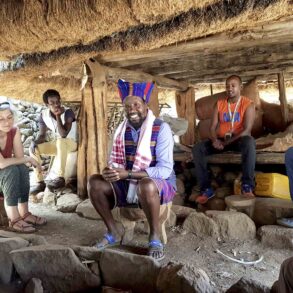There is a war in Europe [and, as of this publication, in the Middle East] which is probably on everyone’s mind and at the same time making them feel powerless.
The logic of war is clear for both sides of the parties at war and their allies: go all out to the bitter end. We can imagine how far this could actually go but do not want to admit it, although voices warning against the outbreak of a wider “world war” could not be clearer. And there are flashpoints, catastrophes and trouble spots on all continents, quite apart from serious personal crises. However, this is not about alarmism but about waking up and realising that we are on an “apocalyptic threshold”.
Does the power of meditation have any significance here? Is this component sufficiently considered today, even within the anthroposophical movement? Meditation, not as an escape into “mystical realms” or an escape from today’s reality, but as “help in need”.
Building “Reinforcing Communities”
An intensive meditative life, carried out in private, forms the basis of spiritual efficacy. But to increase its power to a level commensurate with the adversarial forces of our time requires conscious reinforcement by a community engaged in meditative practice. Furthermore, spiritual potency is strengthened when, in a selfless inner attitude, all members of a community carry each other in their consciousness, addressing the higher I of the other, to give each other strength through meditation. This starts with basic social attitudes, through interest and appreciation when others achieve something positive in the world. Effective spiritual beings can then connect with such groups if a spiritual consciousness lives in these communities, work teams, or initiative organizations.
Far from sectarian behaviour or esoteric conceit, such an association can come about through inner connection in the meditative endeavour of each and every individual. It is a joint endeavour insofar as everyone takes responsibility for their own commitment to regular meditation, knows this about each other, and remains faithful to this promise.
The Impulse of the “Esoteric Youth Circle”: Meditating for Others
Suggestions in this regard can be found in the accounts of the so-called Youth Circle, which have been available since 1998 in the Complete Edition (CW 266/3).1 This article is less about the question of membership in such a circle and more about the use of a spiritual methodology such as the one Rudolf Steiner developed in founding this circle; that is to say, meditating in a committed and active way for others. This selfless, empathic attitude in meditating could spread still further and thereby increase the potency of the meditative forces. How easy it is otherwise for spiritual striving and even meditation to acquire egoistic tendencies.

Apart from independent or professional groups, it is anthroposophical study groups and research communities that can increase their effectiveness through an esoteric life in present times. Such communities have the possibility to be particularly culturally effective because a quality that transcends occupation and is universally human is central to them. If we ask ourselves how anthroposophical groups and branches can be invigorated, then an intensive, deepened culture of meditation could be the answer. The same applies to internally strengthening anthroposophical establishments and institutions. Through joint social meditative work, a corresponding esotericism can also be built and revitalised in the “First Class of School of Spiritual Science”, as Johannes Kiersch sets out.2
No Secretiveness, but Openness to the Needs of People
Esoteric circles that work seriously and fructify life build on inner earnestness and individual spiritual work and not on anachronistic secretiveness. In this context, meditative work is not an end in itself but places itself at the service of the requirements of life and the needs of our time. Meditative work enables such a group to be perceived, recognised, and strengthened by the spiritual world so that the strength gained can have an effect on the outer development of civilisation.
This is meditative Christian action at its deepest core—a contemporary way of calling on helpful beings from the spiritual world so as, in turn, to offer individualised, transformed spiritual forces sacrificially into the “dark zones” of today’s world. So it is not, as with many of today’s fashionable “esoteric” trends, about our own spiritual experiences or about an escape from the hard reality of life. After all, it is precisely in the confrontation with contemporary life that the effects of meditation appear, often emerging in unexpected places following our personal experiences of powerlessness and mysterious processes of transformation. If this meditative attitude arises not only from a sense of duty but from a heartfelt need, then the joy of life and inner fulfilment also find their place.
Esoteric Group Processes are Inclusive: the Spirit Bloweth Where It Listeth
This must not be about finding an “ideal group”; inner steps are possible in every community, in marriage, in partnerships, in work teams, in anthroposophical study groups and institutions, including in the context of the “First Class of the School of Spiritual Science” or in independent research communities. Highly agile spiritual action, above all with presence of mind, will find ways of helping to build up or establish new social and esoteric meditative work of this kind in the most diverse communities and social contexts. Because “For where two or three gather in my name, there am I with them” (Matthew 18:20).
This kind of social culture of meditation is connected with the spiritual event of our time: the work of Christ in the etheric.3 It can revitalise all spiritual work today or make it possible in the first place.
A Question for The Future
Can we, as esoterically striving contemporaries, find or form new meditation communities in a contemporary form? Are we ready to help each other in this, to bear the threshold situation, to go through it? Above all, can we become meditation communities that are meaningful for the world and not just self-sufficient with their own esotericism? Can we find our way to spiritual deeds, to being of help when countless people are in need all over the world? It is worth trying.
Translation Christian von Arnim
Photo Dave/Unsplash
Footnotes
- Rudolf Steiner, Esoteric Lessons 1913–1923. From the Esoteric School, CW 266/3 (SteinerBooks, 2008).
- Johannes Kiersch, Vom Land aufs Meer – Steiners Esoterik in verändertem Umfeld [From land to sea – Steiner’s esotericism in a changed environment] (Stuttgart, 2008).
- Rudolf Steiner, Das Ereignis der Christus-Erscheinung in der ätherischen Welt (The Event of the Appearance of Christ in the Etheric World), GA 118 (Rudolf Steiner Verlag, Dornach).













